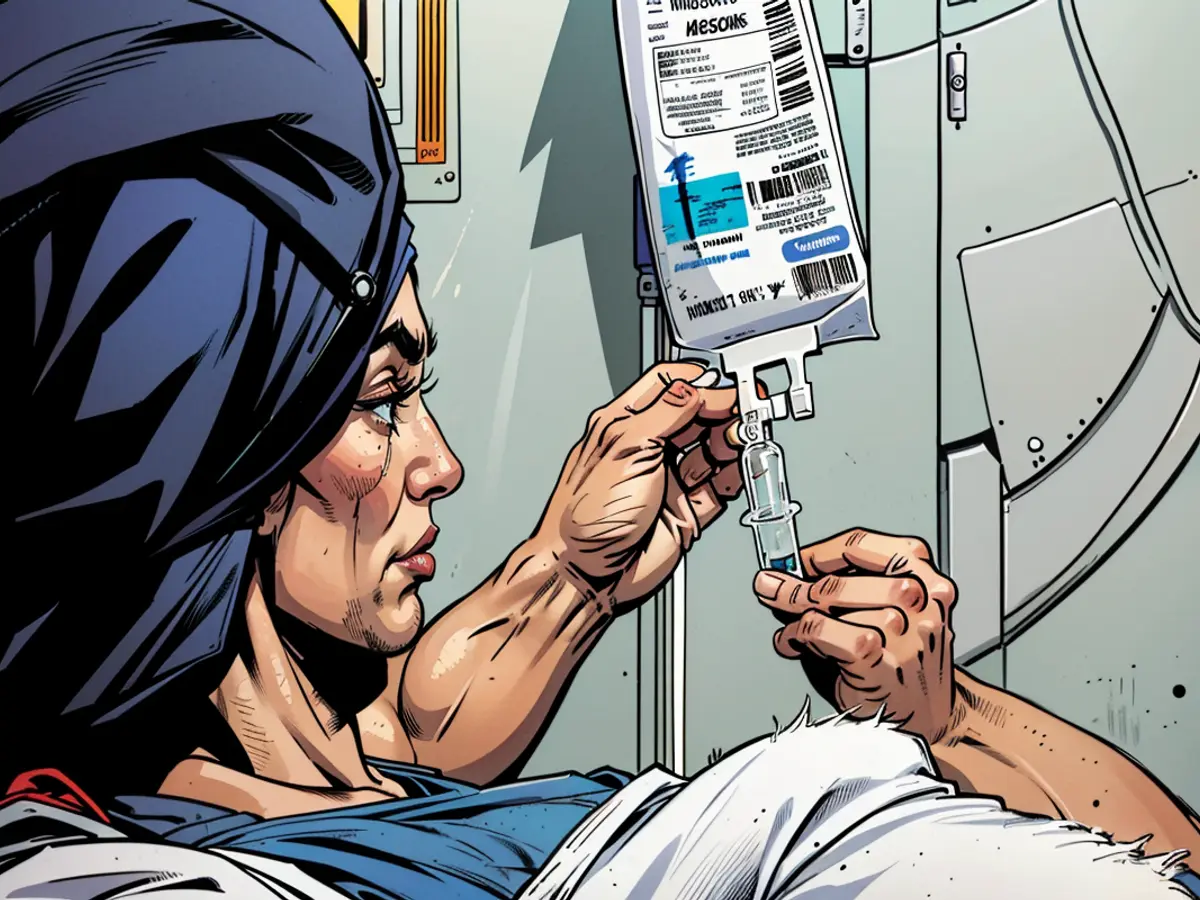U.S. medical facilities face strain due to constrained IV fluid stockpiles following the impact of Hurricane Helene on a manufacturing facility
Baxter International's North Cove site in Marion, North Carolina, which is among the country's largest manufacturers of IV fluids and dialysis solutions, was seriously impacted by Hurricane Helene. The site had to temporarily shut down due to the storm's rain and surge, as stated by Baxter.
Following a short hiatus, Baxter reinitiated the distribution of supplies, but with limitations on the order volume.
The impact of the hurricane has somewhat minimized for healthcare providers, but many hospitals are still running under special resource-conserving protocols.
On Wednesday, Baxter announced it would boost the allocation of highly demanded IV fluids to up to 60% of the usual order volume. This move aimed to curb stockpiling and enhance the chances of equitable access to the available products.
Baxter also revealed that the allocations of IV solutions and pediatric nutrition products for children's hospitals would return to full capacity, with certain IV solution products potentially reaching full allocation by year's end.
While the increased allocations by Baxter have eased some concerns, Nancy Foster, the American Hospital Association's vice president of quality and patient safety policy, noted that the challenges remain real.
Baxter is responsible for supplying approximately 60% of IV fluids to U.S. hospitals, and some institutions rely solely on Baxter products. Despite no new shortages being declared by the U.S. Food and Drug Administration due to Hurricane Helene, the lack of production at the Baxter site could worsen the situation for certain products that were already in shortage.
Dr. Paul Biddinger, the chief preparedness and continuity officer at Mass General Brigham, expressed uncertainty about the impact of Baxter's increased allocations on his hospital's operations.
Mass General Brigham hasn't had to postpone any surgeries or alter any care yet, but it is operating under an emergency operations plan originally implemented for the Boston Marathon bombing and the peak of the Covid-19 pandemic. The hospital has also been making substitutions, such as using oral medication alternatives when possible and offering patients Gatorade or Pedialyte for hydration.
Biddinger warned that the potential impact on operations is significant and requires constant monitoring.
UVA Health University Medical Center has postponed some non-urgent elective surgeries until at least the end of the week to preserve supplies and minimize disruptions to patient care.
Providers emphasize that they do not wish to alarm patients, and they assure them that they will continue to provide necessary medical care, possibly through altered methods.
Preparing for future storms
The American Hospital Association sent a letter to President Biden urging swift action to enhance the provision of IV fluids in the wake of Hurricane Helene.
U.S. Department of Health and Human Services Secretary Xavier Becerra shared details of potential measures the federal government is considering to alleviate the strain on supply in a letter to healthcare leaders. Among these options are alternative manufacturing facilities, temporary imports, and expedited assessments of these proposals.
The Department of Health and Human Services has also collaborated with other domestic manufacturers to bolster supply. However, the possibility of another major storm causing further disruptions to an already fragile market remains.
Another major U.S. manufacturer, B. Braun Medical, has stepped up production at its Irvine, California, and Daytona Beach, Florida, sites. However, the Daytona Beach facilities will temporarily close as Hurricane Milton approaches the Florida west coast, posing a threat to millions of people. In anticipation of the storm, finished products will be relocated to a secure facility in a more northerly location.
Alli Longenhagen, director of corporate communications for B. Braun Medical, emphasized that the Daytona Beach facility is an essential part of its plan to address the shutdown of Baxter's IV solutions manufacturing facility in North Carolina. The focus is on safeguarding employees and minimizing the storm's impact on IV solutions supply.
Essential for diverse patient treatments
IV fluids serve multiple medical purposes. While some conditions, like dehydration, can be managed with alternative methods, others, particularly organ transplant surgeries, cannot.
Dr. Chris DeRienzo, chief physician executive with the American Hospital Association, described IV fluids as "the lifeblood" of treating a diverse range of patients. He noted that IV fluid supply is especially essential during respiratory virus season, which is fast approaching in the U.S. It becomes difficult to maintain hydration when patients have trouble breathing, and IV fluids often serve as the first line of defense when severe cases of flu, Covid-19, and RSV cause a patient's blood pressure to decrease.
"We've still got 40% of the way to go, and that's going to take numerous compounding efforts" to recover, DeRienzo said. "It's only going to be from layer upon layer upon layer, increased output here, increased allocation there, to even get close to 100% of what the nation's hospitals are used to working with this time of year."
In 2017, Baxter facilities in Puerto Rico were severely affected by Hurricane Maria. Disruptions to the medical supply chain, particularly around IV bags used to administer and dilute medications, persisted for several months.
The considerable interruptions to the IV fluid provision subsequent to Hurricane Helene mark yet another hurdle, unearthing weaknesses in the grander American supply chain infrastructure.
As per reports from the American Society of Health-System Pharmacists and the University of Utah Drug Information Service, an unprecedented amount of medications encountered stockouts in the initial quarter of 2024. Though the scenario has somewhat improved in recent periods, there have still been over 300 instances of stockouts persisting for the past 1.5 years.
CNN’s Meg Tirrell helped compile this article.
Despite the increased allocations by Baxter, many hospitals are still implementing resource-conserving protocols to ensure the efficient use of limited supplies. Healthcare providers are working diligently to minimize disruptions and find alternative solutions, such as using oral medication alternatives when possible, to maintain patient care.








